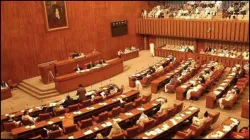Pakistan: Senators slam 'ignorance' after police save woman from mob accusing her of blasphemy
The teenage girl wearing a shirt with Arabic letters was almost attacked by a mob when someone alleged her dress had Quranic verses on it. However, the police managed to intervene and took the girl into protective custody, and the girl later apologised.

Islamabad: A teenage girl wearing an Arabic print shirt was saved by Pakistan police in Lahore from a charged mob accusing her of blasphemy. The incident raised a storm within the Pakistani Senate as several lawmakers called for strict action against those levelling "false charges of blasphemy" and slammed "ignorance", reported Dawn.
The incident occurred on Sunday when a mob gathered outside a shop in Lahore’s crowded Ichra Bazaar after someone alleged that a woman’s shirt had Quranic verses printed on it. The mob was seen looking for the woman, accusing her of committing blasphemy, as the scared girl hid in a shop. However, police officials present in the area informed their superiors.
Soon after, a police team led by Gulberg Circle Assistant Superintendent of Police (ASP) Syeda Shehr Bano Naqvi engaged the crowd, took the woman into protective custody and shifted her to the police station amid heightened security measures. Later in the day, a video showing the woman apologising alongside religious scholars emerged.
What did the Senators say?
Pakistan Peoples Party (PPP) Senator Rubina Khalid said that it was “utter ignorance” that some people could not differentiate between Quranic verses and Arabic letters. “If the police had not reached on time the inciteful mob would have done something worse,” she said, while also criticising the girl's 'forceful apology'.
Rubina added that the shirt the woman was wearing belonged to a brand based in Saudi Arabia. “It is fine there, but here women are harassed in the name of religion. We are all Muslims and are proud of it […] but there is a huge difference between an ignorant and a Muslim," she said.
“What kind of a Muslim is someone who cannot identify between a Quranic verse and a simple Arabic word? And what kind of a Muslim is someone who, despite knowing how to read Arabic, makes false accusations against someone?” said Muttahida Qaumi Movement-Pakistan (MQM-P) Senator Faisal Subzwari.
The MQM-P Senator regretted that the House could not complete legislation over the misuse of blasphemy laws and said using religion to level false allegations was the worst form of disrespect. "Who is defaming the religion? Is it that woman or is it the people who despite reading the letters falsely accused her?” he asked.
Meanwhile, the police informed that the video of the woman apologising was filmed with “consent” and was important for the long-term safety of the woman. The incident occurred after a man in the locality went up to the woman and told her to change her clothes.
Blasphemy in Pakistan
Notably, many religious minorities in Pakistan, including Christians and Hindus, have been frequently subjected to blasphemy allegations and have been tried and sentenced under the country's strict blasphemy law. Accusations of blasphemy provoke people into taking matters into their own hands and embolden 'mob justice' which has claimed several lives.
In August, a mob in the Faisalabad district vandalised several churches and the house of Christian worshippers on blasphemy allegations. While police maintained it was trying to contain the situation with the help of peace committees, Christian leaders alleged that they remained silent spectators.
Despite several calls to amend the blasphemy laws, the Pakistan Senate passed a Bill earlier that month to ramp up punishment for blasphemy to 10 years of imprisonment. The Pakistani Human Rights Minister had then suggested to former Prime Minister Shehbaz Sharif that the state had a duty to protect religious minorities.
The 2023 report of the US Commission on International Religious Freedom noted that Pakistan's religious freedom conditions had continued to deteriorate since last year. "Religious minorities were subject to frequent attacks and threats, including accusations of blasphemy, targeted killings, lynchings, mob violence, forced conversions, sexual violence against women and girls, and desecration of houses of worship and cemeteries," it said.
ALSO READ | Lareb Hashmi stabbing: Who is Maulana Khadim Hussain Rizvi, Pakistan's 'blasphemy activist'?